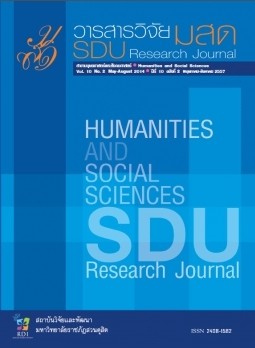การเปรียบเทียบความแม่นยำในการประเมินตนเองระหว่างผู้เรียนที่มีความสามารถ แตกต่างกันในการทดสอบที่มีการให้ข้อมูลย้อนกลับโดยใช้ระบบคอมพิวเตอร์**
Keywords:
Computer-Based TestingAbstract
This study aimed to 1) compare the self-evaluation accuracy of students different levels of ability 2) compare the self-evaluation accuracy of students with different types of feedback after a computer-based testing system with immediate feedback 3) study types of feedback and its effectiveness to students with different ability levels. The study conducted with 786, grade 12, students studying mathematics-science program from 7 schools in
Bangkok metropolitan area in their first semester of academic year 2017 (May 2017 –
September 2017). The results revealed that 1) students with different levels of ability had significantly different mean of their self-evaluative score (F=74.450, Sig=0.000). Students with high level of ability (excellent group) had the highest score compared to moderate group and poor group (M=16.75, SD=3.150) 2) students provided with different types of feedback had
significantly different mean of self-evaluative accuracy score (F=7.640, Sig=0.000). Students provided with full directive feedback (FDF) had the highest mean of self- evaluative accuracy score (M =15.22, SD= 3.885) compared to any other types of feedback 3) poor group had significantly higher mean of self-evaluative accuracy score when immediate full directive feedback were provided compared to any other types of feedback. Furthermore, excellent group and moderate group also had significantly lower mean of self-evaluative accuracy score when partial directive feedback were provided compared to any other type of feedback.
References
behavior in online assignments. Computers & Education, 87, 123-130. Attali, Y., Power D. (2008). Effect of immediate feedback and revision on psychometric
properties of open-ended GRE Subject Test items (ETS GRE Board Research
No.04-05). Educational Testing Services. Attali, Y., Power D. (2010). Immediate feedback and opportunity to revise answers to
open-ended questions. Educational and Psychological Measurement, 70, 22-35. Attali, Y. (2011). Immediate Feedback and Opportunity to Revise Answers : Application of a Graded Response IRT Model. Applied Psychological Measurement, 35(6), 472-479. Attali, Y. (2015). Effects of multiple-try feedback and question type during mathematics
problem solving on performance in similar problems. Computers & Education, 88, 260-267. Berk, R. A. (2006). Thirteen strategies to measure college teaching: A consumer’s guide to rating scale construction, assessment, and decision making for faculty, administrators, and clinicians. Sterling; VA: Stylus Publishing. Bol, L., Hacker, D. J. (2001). A comparison of the effects of practice tests and traditional review on performance and calibration. The Journal of Experimental Education., 69, 133151. Dunlosky, J., Rawson, K. A. (2015). Do students use testing and feedback while learning? A focus on key concept definitions and learning to criterion. Learning and Instruction, 39, 32-44. Eberlein, M. (2010). The effects of feedback on self-assessment. Bulletin of Economic Research, 63(2), 177-199. Epstein, M. L., Epstein, B. B., Brosvic, G. M. (2001). Immediate feedback during academic
testing. Psychological Records, 88, 889-894.
Gouli, E., Gogoulou, A., Grigoriadou, M. (2008). Supporting Self-, Peer-, and Collaborative-
Assessment in E-Learning: The Case of the Peer and Collaborative Assessment
Environment (PECASSE). Journal of Interactive Learning Research, 19(4), 615-647. Klassen, R. M. (2006). Too much confidence? The self-efficacy beliefs of adolescents with learning disabilities. In F. Pajares & T.Urdan (Eds.), Self-efficacy beliefs of adolescents. Greenwich, CT: Information Age. Labuhn, A. S., Zimmerman, B. J., Hasselhorn, M. (2010). Enhancing students’ self-regulation and mathematics performance: the influence of feedback and self-evaluative
standards. Metacognition Learning, 5, 173-194. Lipko-Speed, A., Donlosky, J., Rawson, K. A. (2014). Does testing with feedback help grade-school children learn key concepts in science?. Journal of Applied Research in Memory and Cognition, 3, 171-176. Narciss, S., Koerndle, H., & Dresel, M. (2011). Self-evaluation accuracy and satisfaction with performance: Are there affective costs or benefits of positive self-evaluation bias? International Journal of Educational Research, 50(4), 230–240. Pekrun, R., Cusack, A., Murayama, K., Elliot, A. J., Thomas, K. (2014). The power of anticipated feedback: Effects on students’ achievement goals and achievement emotions. Learning and Instruction, 29, 115-124. Sheldrake, R., Mujtaba, T., Reiss, M. J. (2014). Calibration of Self-evaluations of Mathematical ability for Students in England Aged 13 and 15, and Their Intentions to Study Non-compulsory Mathematics after Age 16. International Journal of Educational Research. 64, 49-61. Shute, V. J. (2007). Focus on Formative Feedback (Research & Development). Educational Testing Services. Spiller, D. (2009). Assessment: Feedback to promote student learning. Teaching Development Unit: The University of Waikato. Van der Kleij, F. M., Eggen, T. J.H.M., Timmers, C. F., Veldkamp, B. P. (2012). Effects of feedback in a computer-based assessment for learning. Computers & Education, 58, 263-272. Wray, E. (2013). RISE Meaningful Feedback Model. Retrieved July 25, 2017, from http://www. risemodel.com. Yastibas, G. C., Yastibas, A. E. (2015). The effect of peer feedback on writing anxiety in Turkish EFL (English as a foreign language) students. Procedia - Social and Behavioral
Sciences, 199, 530-538.Zimmerman, B. (2000). Self-efficacy: an essential motive to learn. Contemporary Educational Psychology, 25(1), 82-91. Translated Thai References Chommanee, M., & Suwanmonkha, S. (2014). An Analysis of Teachers' Coaching Processes and the Effects on Students: Multiple Case Study Research. OJED, 9(2), 489-499. (in Thai) TongSri, A., Panhoon, S., & Jiraro, P. (2016). Development of a Self-assessment Checklist for Developing Mathematical Problem Solving Skills of 6th Grade Students. SDU Research Journal Humanities and Social Sciences, 12(1), 119-134. (in Thai)








